- Waterloo releases first Sustainable Development Goals report
- Q and A with the experts: Earth Day and the climate crisis
- Retiring staff member leaving something better behind: a repair culture on campus
- Arts professor to facilitate anti-racism book club in May
- Construction work to begin on pedestrian path from Village 1 to Lyle Hallman
- Friday's notes
Editor:
Brandon Sweet
University Communications
bulletin@uwaterloo.ca
Waterloo releases first Sustainable Development Goals report
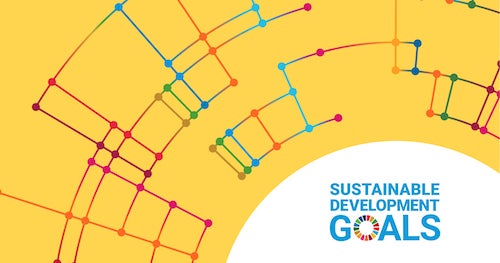
A message from the Sustainability Office.
On Earth Day 2022, Waterloo is excited to release its first report to reflect on some of the work being done across the University to advance the United Nations Sustainable Development Goals (SDGs). These 17 goals are a global framework agreed to by all countries, intended to guide nations and institutions in building a better future for all.
“The UN SDGs are meant to inspire action toward a socially, economically, and environmentally sustainable future,” says President and Vice-Chancellor Vivek Goel. “Countries and institutions around the globe are reflecting on how their actions contribute toward this vision, and it is exciting to see Waterloo continue to embrace and champion these goals.”
The report includes a foreword from President Goel, key accomplishments achieved in 2021, different campus groups whose efforts are supporting sustainable development toward each SDG goal, and plots the number of researchers, publications, collaborations, and courses that touch on SDG topics. Great progress is indeed being made. Yet more is still needed, and the report ends with a survey of opportunities for the University to increase its impact both locally and globally.
“The SDGs are a very holistic framework, and as such both the report and its contents represent the cumulative effort and incredible work of many individuals and groups across campus,” says Mat Thijssen, Director of Sustainability. “Even though we are just capturing a part of work, it is encouraging to see activity under each of the SDGs, and we know there is much more to be done.”
Led by the Sustainability Office, contributions were made by Institutional Analysis and Planning, University of Waterloo Library, Equity, Diversity, Inclusivity and Anti-Racism, Indigenous Relations, Campus Wellness, and Waterloo Undergraduate Student Association, among many others.
All members of the University community are encouraged to read the report and continue to support and accelerate the many efforts underway across campus to build a prosperous, equitable, and sustainable world.
Q and A with the experts: Earth Day and the climate crisis


Many view the first Earth Day as the beginning of the modern environmental movement. In advance of Earth Day 2022 on April 22, Sarah Burch, a professor at the University of Waterloo and Canada Research Chair in Sustainability Governance and Innovation, discusses its relevance more than 50 years on. She is the executive director of Waterloo's Interdisciplinary Centre on Climate Change and a lead author of the recently released report of the Intergovernmental Panel on Climate Change (IPCC), the UN body that assesses the science related to our changing climate.
Listen to Sarah Burch's full interview on today's episode of the Beyond the Bulletin podcast.
The UN Climate Report stated that there has been a reduction in greenhouse gas emissions in some countries. Is that promising news?
The global picture is that we've seen the largest average annual increase in greenhouse gas emissions that we've ever seen in human history. So globally, greenhouse gas emissions continue to go up. However, the flip side is that we're seeing real evidence for the first time of sustained greenhouse gas reductions in around 20 countries. Those reductions are unfortunately swallowed up by the global increase, but they do show us that it's possible. They show us that good climate change decisions and policies are having a real effect, and we have a template to follow.
Earth Day is a day when individuals show support for environmental protection. Does it still matter when so many years after the very first Earth Day we continue to have serious environmental problems?
Earth Day began as a moment to reflect on the natural environment and the impacts that we were having on that. What I appreciate about our conversation today is that we're starting to talk about all the important ways that climate change and other environmental problems like it are not simply environmental problems, they're people problems, they’re social problems. So I think Earth Day gives us pause to think about how much a part of nature humans really are and to re-examine our relationship to nature and what it means to have a just, inclusive and sustainable society. The IPCC report kind of sets the stage for Earth Day as a moment of reflection, on how far we've come and how far we need to go. What the IPCC report demonstrates really powerfully is that the solutions that we need are already available. And so Earth Day offers us this opportunity to have a conversation about the behaviours we need to change, the politics that we need to change.
How much is it the responsibility of individuals to get us to reach that target of limiting warming to 1.5 degrees Celsius?
The IPCC tells us that individuals and individual choice control 40 to 70 per cent of our greenhouse gas emissions. But the report concludes that in many ways, our hands are tied as individuals. We're locked into high-carbon ways of living because our cities are designed the way they are. So it's actually collective decisions that are made by governments at all levels that would unshackle us from those high-carbon pathways and allow us to unleash the potential of individual choice.
The theme of Earth Day 2022 is Invest In Our Planet. Can we buy or spend our way out of the climate crisis?
We can't consume our way out of this crisis. I do think, though, that the IPCC report shows that we are underspending on this transition by 300 to 600 per cent. So our investment, our finance, the flow of funds need to go up by a factor of three to six to really accelerate this change at the scale we need. And that's investment in renewable energy, and in the technologies, the industrial processes, the vehicles, all of this that we need as part of the transition. So that kind of spending is absolutely crucial. It’s a huge justice issue because we know that the poorest countries globally are the hardest impacted by climate change and don't necessarily have the resources that they need to leap over this dirty phase of development towards a cleaner renewable-energy path. And that is a responsibility of wealthier industrialized nations like ours.
Listen to the full interview with Sarah Burch on Beyond the Bulletin.
Retiring staff member leaving something better behind: a repair culture on campus
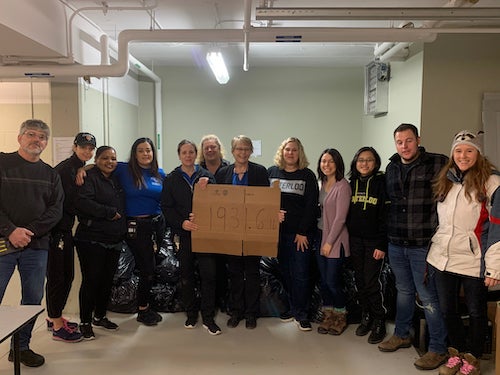
After 45 terms (that’s 15 years) as an Instructional Support Coordinator with professional development programs for co-op students, Murray Zink (BASc '80 and MASc '84) is planning his retirement. But that doesn’t mean he’s leaving campus. He’s on a mission to grow the sustainability and repair culture at the University of Waterloo.
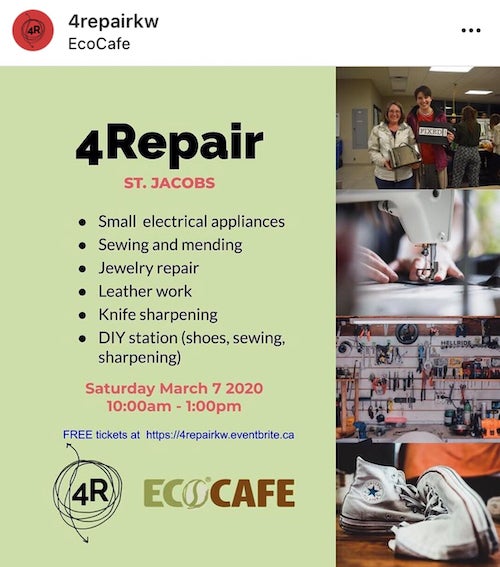
For the past four years, Murray has been building 4RepairKW, a local team of volunteers that hold repair events to promote sustainability and repair culture in Kitchener-Waterloo (Instagram @4RepairKW). The group has held repair events with the Sustainability Office here on campus, as well as with the KW Library of Things in Kitchener, and with ECO Café in St Jacobs. After running many successful repair events and visiting repair cafes and tool lending libraries in Toronto, California, and Denmark, Murray is fired up about bringing this repair culture to campus.
Along the way, Murray connected with the Campus Housing team to source non-working small electrical items for the repair events. And before he knew it, he was working with that team on the first ever move-out waste diversion effort to keep cast-off items from the residences (food, clothing, kitchen appliances, etc.) out of the landfill. Those initial efforts diverted 1,400 pounds of waste in August 2019 and then another 1,900 pounds in December 2019. Due to the pandemic the project was sidelined for 2 years, but it is now back building steam with a goal to divert 8000 pounds, from the majority of campus residences, this term. With the expectation that cast-off items will amount to about three cube vans of material, Murray is helping to identify organizations that can use these items (the Food Bank will take unopened, unexpired food items, while a company in Elmira will process the expired food items in a digester).
Murray plans to take the broken appliances (kettles, toasters, hairdryers, etc.) as fodder for his new project – 4RepairUW. With a generous award from the Sustainability Action Fund to promote repair culture at UWaterloo, Murray intends to launch 4RepairUW this spring. 4RepairUW will operate somewhat like a pop-up club on campus wherever partner groups can arrange workspace. 4RepairUW will organize experienced repairers as well as tools and common supplies needed for repairs. Everyone is welcome to show up to learn about repairs, share ideas, and gain hands-on experience.
And this is where Murray hopes to break the fourth wall (to appeal to others to get involved with sustainability initiatives). Murray will continue organizing veteran repairers from on campus and the community to assist with repairs and share their knowledge with repair neophytes. This will provide an opportunity to volunteer for students, retirees, and community members who would like to become involved with growing a sustainability and repair culture on campus (in perpetuity).
There are many motivators for Murray. One motivator is the UN’s SDG #12 - Responsible Consumption and Production, the sustainability development goal that broadly covers everything we buy and use. It’s also about helping people save money by fixing things and not throwing them away. It’s about sharing knowledge and learning from each other. For all who become involved, it’s about lifelong learning to gain knowledge and skills, as well as gaining self-confidence and purpose through using tools to fix things.
So, if you connect with any of these ideas about sustainability and repair, or if you have ideas about needs in our community and distributing move-out waste, follow up with Murray for a coffee.
Arts professor to facilitate anti-racism book club in May
A message from the President's Anti-Racism Taskforce (PART).
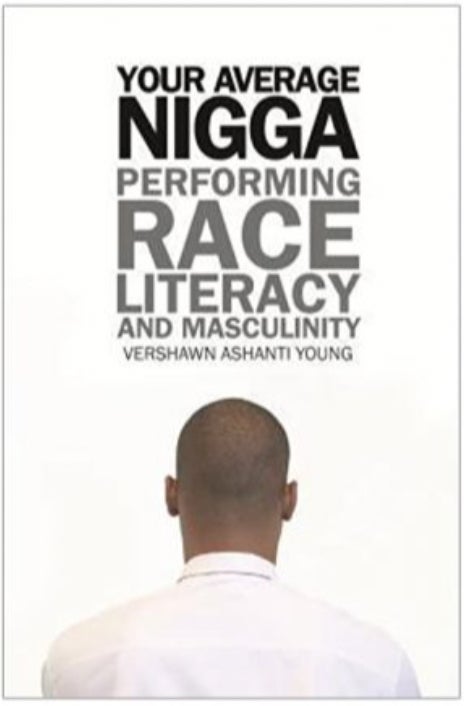
Professor Frankie Condon from the Faculty of Arts will facilitate the next Anti-racism book club, scheduled for May 19 at 12 noon. Condon will be joined by her faculty colleague, Vershawn “dr. vay” Young, to discuss his book Your Average Nigga: Performing Race, Literacy, and Masculinity. The conversation promises to be riveting as Condon and Young will delve into the book’s controversial title and its provocative argument.
Your Average Nigga is dr. vay’s autobiographical analysis of the linguistic conflict that he claims exists between Black and white language styles. dr. vay, who teaches in both the departments of Communication Arts and English Language and Literature, draws from his personal experiences to argue against language instruction that requires Black English speakers to give up their language to succeed academically.
“When Black students are forced to choose standard English, they risk alienating themselves from their Black identities, families and communities and if these students are forced to choose to retain their customary speech and behavior then they risk isolating themselves from mainstream society,” dr. vay explains. This dilemma is resolved, according to dr. vay, by integrating these languages in school rather than keeping them segregated.
Pointing to the bold title of his book, dr. vay is also concerned about banning the N-word on campuses – an issue the University of Waterloo grappled with in 2020.
“To forbid the N-word actually serves the purposes of white supremacy and resuscitates racism rather than defeat it. I say this because we know our society oppresses Black people. But do you know that we are also culturally suppressed in predominantly white spaces? Barring the N-word functions as a too-easy way to quash the six or seven insightful ways the word functions in Black culture.”
Frankie Condon is excited to co-facilitate the book club with dr.vay, with whom she has collaborated on several projects. Professor Condon and dr. vay are co-authors of Performing Anti-racist Pedagogy in Rhetoric, Writing and Communication. Condon looks forward to a spirited exchange, where she will ask book clubbers to tackle how we look at both race and language.
“I look forward to this discussion with the campus community,” Condon said. “dr. vay’s text will undoubtedly be a catalyst for engagement on bigger topics surrounding race, ethnicity, and culture.”
Find registration information for PART’s anti-racism book club.
We recognize that the conversations on race and racism can be difficult. If you have any concerns about this article or the upcoming event, please forward your concerns to the Anti-racism communications manager. If you have experienced harm or trauma and would like to make a disclosure, please connect with the Equity, Diversity, Inclusion & Anti-racism office here.
Construction work to begin on pedestrian path from Village 1 to Lyle Hallman
Plant Operations is starting a construction project to rebuild the landscaping outside the University Club and Lyle Hallman to repair the underground service tunnel and provide a new pedestrian path for students coming from V1 into the general campus.
"Plant Operations along with Campus Housing continues their effort in improving the infrastructure and revitalizing campus space for the enjoyment of the University community," says a notification from Plant Operations. "On Monday, April 25, construction will begin with temporary fencing to protect the work site. Inside the site crews will work to rehabilitate the tunnel that provides utilities to the campus residences and create a paved walkway with seating and landscape planting along the way."
"We request that patrons consider alternative routes and timing for their safety and security," says Plant Operations. "We thank you for your patience during this time."
The project is scheduled to continue from the spring into the early fall.
Friday's notes
"The Engineering Machine Shop would like to announce the retirement of Jorge Cruz as Storekeeper after 21 years of service at UWaterloo," says a note from the Engineering Machine Shop. "Well-wishers are welcome to join Jorge at 12 noon until 1:00 p.m. on Friday, April 29 for light refreshments and snacks in E2-1732."
The next IT Professional Development Advisory Group (PDAG) seminar is entitled Confluence and will feature presenter Matt Harford and moderator Greg Parks today from 9:00 a.m. to 9:45 a.m. via Teams.
"Confluence is a team collaboration software that allows groups to share, edit and communicate effectively in one, central location," says a note from PDAG. "Confluence is a powerful tool for organizing content and is especially effective as a Knowledge Base platform. This presentation will provide a quick introduction to Confluence and how we are using it at uWaterloo.
For example the IST Knowledge Base is hosted on Confluence."
Matthew Harford is the Manager for the IST Service Desk team. He has been working on campus since 2009, initially as student staff. When he is not helping people at work, he likes to spend his time woodworking and enjoying the outdoors.
This session will be recorded and shared on MS Stream via the PDAG Channel.
Beyond the Bulletin Episode 124
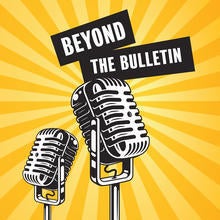
The latest episode of the Beyond the Bulletin Podcast is now live. Sarah Burch, Canada Research Chair and executive director of the Interdisciplinary Centre on Climate Change discusses Earth Day and her work on the UN Climate Report. The University is extending the face-covering requirement until further notice. Waterloo joins the Scholars at Risk Network. And W Store and the Office of Indigenous Relations curate a new collection of Indigenous products in collaboration with Morningstar Designs.
Link of the day
When and Where to get support
Students can visit the Student Success Office online for supports including academic development, international student resources, immigration consulting, leadership development, exchange and study abroad, and opportunities to get involved.
Instructors looking for targeted support for developing online components for blended learning courses, transitioning remote to fully online courses, revising current online courses, and more please visit Agile Development | Centre for Extended Learning | University of Waterloo (uwaterloo.ca).
Instructors can visit the Keep Learning website to get support on adapting their teaching and learning plans for an online environment.
Course templates are available within your course in LEARN to help you build and edit your content and assignment pages quickly.
The following workshops, webinars, and events are offered by the KL team (CTE, CEL, ITMS, LIB):
- Independent Remote Course Design Essentials, self-directed, continuous self-enrollment course in LEARN.
- Independent Blended Course Design (iBlend), self-directed, ongoing
- Copyright Overview for Waterloo Instructors and Staff - self-directed, continuous self-enrollment course in LEARN.
- University of Waterloo Teaching and Learning Conference - April 27 and April 28.
Supports are available for employees returning to campus. Visit IST’s Hybrid Work and Technology guidelines and workplace protocols to assist with the transition.
The Writing and Communication Centre has virtual services and programs to help undergrads, grad students, postdocs and faculty members with academic writing.
- Meet with writing advisors in one-to-one appointments to brainstorm, draft, revise, and polish. No time for an appointment? Try email tutoring for undergrads.
- Beat isolation and make writing progress at weekly Virtual Writing Cafés for grad students and faculty or PJ-Friendly Writing Groups for Undergrads.
- Take an online workshop or apply to our popular Dissertation Boot Camp program.
- Faculty can request custom in-class workshops for their courses, or the WCC can facilitate any existing workshops for student groups.
- Course-integrated support available. Attention faculty and instructors: The application form for Writing and Communication Centre course-integrated support is now available online. We offer five unique support streams for your courses including synchronous and asynchronous workshops and monitored discussion boards.
Co-op students can get help finding a job and find supports to successfully work remotely, develop new skills, access wellness and career information, and contact a co-op or career advisor.
The Centre for Career Action (CCA) has services and programs to support undergrads, grad students, postdocs, alumni, and employees in figuring out what they value, what they’re good at, and how to access meaningful work, co-op, volunteer, or graduate/professional school opportunities. Questions about CCA's services? Live chat, call 519-888-4047, or stop by our front desk in the Tatham Centre 8:30 a.m. to 4:30 p.m., Monday to Friday.
Drop-in to Warrior Virtual Study Halls on Wednesdays from 5:30 p.m. to 7:00 p.m. Come together in this virtual space to set goals and work independently or in groups each week.
Renison's English Language Institute continues to offer virtual events and workshops to help students practice their English language skills.
If you feel overwhelmed or anxious and need to talk to somebody, please contact the University’s Campus Wellness services, either Health Services or Counselling Services. You can also contact the University's Centre for Mental Health Research and Treatment. Good2Talk is a post-secondary student helpline available to all students.
The Library is open with expanded hours for access to book stacks, drop-in individual study space, bookable group study rooms, drop-in access to computers and printers, book pick-up services and IST Help Desk support. Librarian consultations, Special Collections & Archives and the Geospatial Centre are available by appointment. Full details on current services and hours are available on the Library’s COVID-19 Update webpage.
The Faculty Association of the University of Waterloo (FAUW) continues to advocate for its members. Check out the FAUW blog for more information.
The University of Waterloo Staff Association (UWSA) continues to advocate for its members. Check out the UWSA blog for more information.
The Sexual Violence Prevention and Response Office (SVPRO) supports all members of the University of Waterloo campus community who have experienced, or been impacted, by sexual violence. This includes all students, staff, faculty and visitors on the main campus, the satellite campuses, and at the affiliated and federated Waterloo Institutes and Colleges. For support, email: svpro@uwaterloo.ca or visit the SVPRO website.
The Office of Indigenous Relations is a central hub that provides guidance, support, and resources to all Indigenous and non-Indigenous campus community members and oversees the University's Indigenization strategy.
The Waterloo Indigenous Student Centre, based at St. Paul’s University College, provides support and resources for Indigenous students, and educational outreach programs for the broader community, including lectures, and events.
WUSA supports for students:
Peer support - MATES, Glow Centre, RAISE, Women’s Centre - Visit https://wusa.ca/peersupport to book an appointment either in person or online for the Fall term.
Food Support Service food hampers are currently available from the Turnkey Desk 24/7 in the Student Life Centre. Drop off locations are also open again in SLC, DC, DP, SCH and all residences.
Co-op Connection all available online. Check https://wusa.ca for more details.
Centre for Academic Policy Support - CAPS is here to assist Waterloo undergraduates throughout their experience in navigating academic policy in the instances of filing petitions, grievances and appeals. Please contact them at caps@wusa.ca. More information is available.
WUSA Student Legal Protection Program - Seeking legal counsel can be intimidating, especially if it’s your first time facing a legal issue. The legal assistance helpline provides quick access to legal advice in any area of law, including criminal. Just call 1-833-202-4571.
Empower Me is a confidential mental health and wellness service that connects students with qualified counsellors 24/7. They can be reached at 1-833-628-5589.
GSA-UW supports for graduate students:
The Graduate Student Association (GSA-UW) supports students’ academic and social experience and promotes their well-being.
Advising and Support - The GSA advises graduate students experiencing challenges and can help with navigating university policies & filing a grievance, appeal, or petition.
Mental Health covered by the Health Plan - The GSA Health Plan now has an 80 per cent coverage rate (up to $800/year) for Mental Health Practitioners. Your plan includes coverage for psychologists, registered social workers, psychotherapists, and clinical counselors.
Dental Care - The GSA Dental Plan covers 60 to 70 per cent of your dental costs and by visiting dental professionals who are members of the Studentcare Networks, you can receive an additional 20 to 30 per cent coverage.
Student Legal Protection Program - Your GSA fees give you access to unlimited legal advice, accessible via a toll-free helpline: +1-833-202-4571. This advice covers topics including housing disputes, employment disputes, and disputes with an academic institution.
The Graduate House: Open Monday to Friday 11:30 a.m. to 6:00 p.m. We’re open to all students, faculty, staff, and community members. The Graduate House is a community space run by the GSA-UW. Vaccination Records and Government ID continue to be required for all dine-in guests. Graduate students who paid their fees can get discounts and free coffee.
When and Where (but mostly when)
Warriors vs. Laurier Blood Donation Battle. Join our “Waterloo Warriors” team on the Blood.ca website or app. #ItsInYouToGive
Warriors truLOCAL Kickback Program, March 22 to April 22. Purchase high quality locally sourced meat and fish while supporting your favourite Waterloo Warriors varsity team. Find out more.
Examination period, Friday, April 8 to April 26.
Warrior Rec Free Exam Fitness, Monday, April 11 to April 22. Yoga, Zumba, Spin, Barre, Warrior Workout and more. Valid Warrior Rec Membership Required. Find out more.
Research Talks, “Health system decision-making in a post COVID-19 Canada,” Tuesday, April 26, 12-1:30 p.m. Registration is required for this online event.
A Conversation on Hope & Climate Change featuring Katharine Hayhoe and IC3 Executive Director, Wednesday, April 27, 10:00 a.m. Register now.